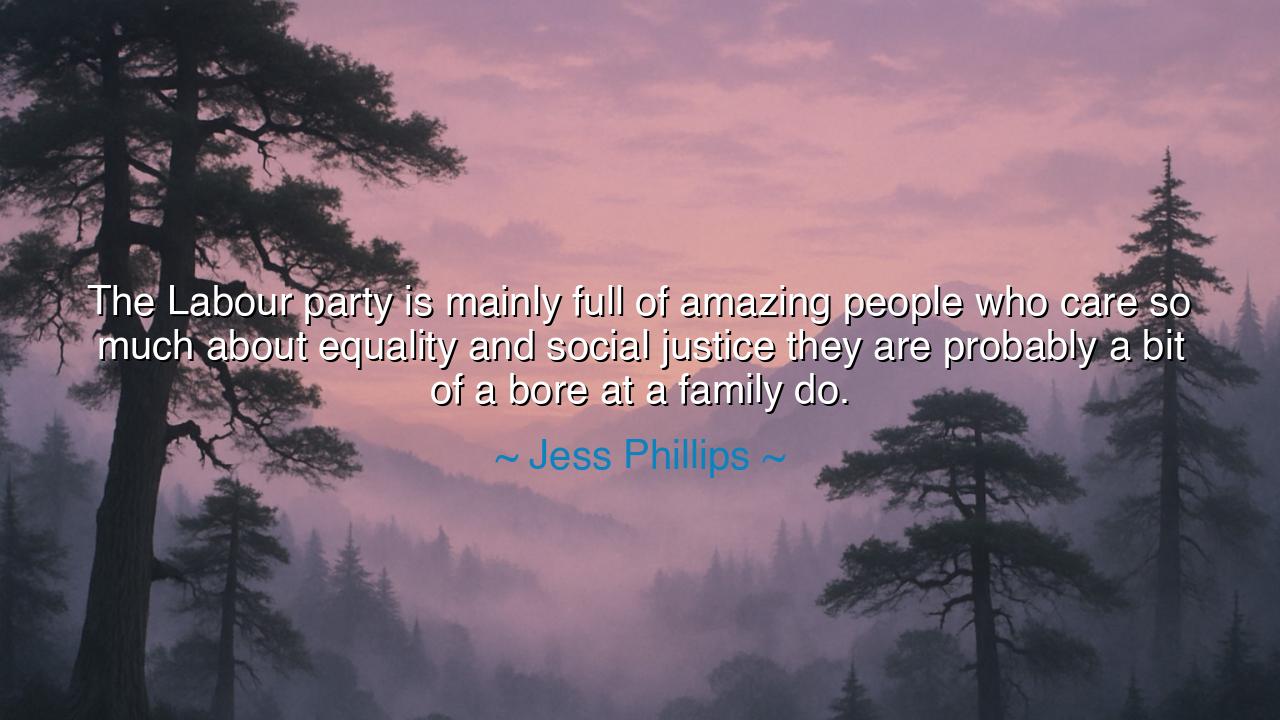
The Labour party is mainly full of amazing people who care so
The Labour party is mainly full of amazing people who care so much about equality and social justice they are probably a bit of a bore at a family do.






In the great pursuit of justice and equality, there are those whose passion burns so brightly that they cannot help but see every aspect of the world through the lens of what is fair and right. Jess Phillips captures this sentiment perfectly when she says, “The Labour Party is mainly full of amazing people who care so much about equality and social justice they are probably a bit of a bore at a family do.” Her words are filled with both humor and truth, revealing a deep irony in the pursuit of justice: that those who seek to change the world often find themselves in the most mundane settings, trying to explain grand ideals to those who may not share their vision.
The ancients too were familiar with this dichotomy between noble ideals and the practical realities of daily life. The philosophers of Athens, such as Socrates, were deeply committed to the pursuit of truth, justice, and the common good. Yet, their ideals often set them apart from the rest of society, making them seem somewhat out of place in the everyday life of the city. Socrates spent his days questioning the beliefs and values of his fellow Athenians, challenging their assumptions about morality, virtue, and society. To many, he was a boring figure—constantly probing and pushing for deeper understanding, much like the Labour members Phillips describes. His dedication to justice often made him an outsider, someone whose passions about the greater good were sometimes too intense for casual conversation.
This tension between ideals and social norms is also reflected in the life of Aristotle, another towering figure of ancient thought. Aristotle believed that true virtue and justice could be achieved through careful reflection and the cultivation of reason, but his commitment to these ideals sometimes made him seem distant or out of touch with the daily realities of the people. In a way, Jess Phillips’s humorous observation is akin to the ancient philosopher’s struggle—being so deeply invested in social change and equality that one becomes consumed by these causes, often losing touch with the simpler pleasures of life, like a family gathering. The journey toward justice is never easy, and it often demands a degree of sacrifice and dedication that can isolate those who follow it too closely.
The story of William Wilberforce, the English politician who led the charge to abolish the slave trade, offers a powerful example of how the pursuit of social justice can make someone seem somewhat removed from everyday society. Wilberforce was consumed by his cause, dedicating his life to the abolition of slavery in the British Empire. His tireless work in parliament and his moral commitment to human equality made him a revered figure, but also one who was often seen as too intense by those around him. At social gatherings, his discussions about slavery and equality were not always welcomed by those whose lives were untouched by such concerns. Yet, it was this very dedication to justice that led to one of the most significant moral victories in history. Like the members of the Labour Party that Phillips describes, Wilberforce’s single-mindedness, though perhaps a bore to some, changed the world forever.
Phillips’s reflection on the Labour Party members captures the essence of sacrifice and commitment that those who fight for equality often make. They choose, sometimes unwillingly, to speak of social justice at every opportunity, even when it makes them seem out of place or overly serious. In this, they embody the ancient ideal of the philosopher-king—someone who is not simply concerned with personal happiness but with the greater good of society. Yet, there is also a lesson here: while the pursuit of justice is noble, it is also important to engage with others in a way that fosters connection, rather than alienation. The struggle for equality requires not just dedication, but the ability to bring others into the conversation, to inspire them to care, and to make the cause of justice accessible to all, not just the committed few.
The lesson from Jess Phillips’s words is that the fight for equality and justice must be balanced with the ability to connect with others in a way that is both inspiring and relatable. Passion for change should not make us so distant from the everyday person that we lose the ability to communicate and unite around shared values. We must speak about our causes in ways that others can understand, find common ground, and foster collaboration. The members of the Labour Party who dedicate themselves to social justice have a duty not only to fight for the voiceless but also to bring others into the fold, to help them see that equality is a cause that can touch every life.
In our own lives, let us take this lesson to heart. We may find ourselves deeply committed to social justice, whether in the fight for equality, freedom, or human dignity, but we must always strive to engage others with compassion, patience, and understanding. Let us never forget that justice is not just about winning battles—it is about winning hearts and minds, about building a future where every individual is valued and respected. In this pursuit, let us remain humble and accessible, remembering that while our passion may sometimes isolate us, our purpose is to bring others along in the journey, to ensure that the fight for equality is not just a noble ideal but a shared reality.






AAdministratorAdministrator
Welcome, honored guests. Please leave a comment, we will respond soon